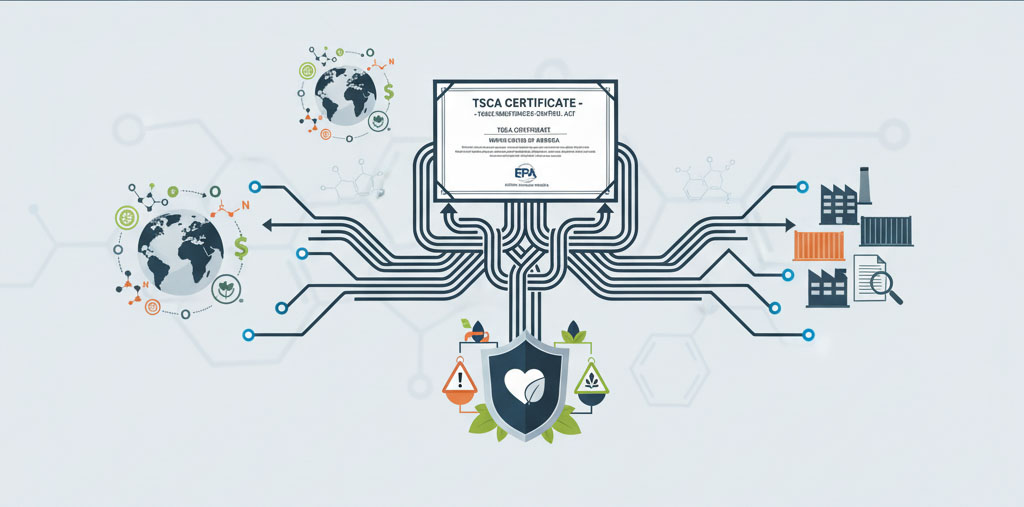
The safe production and use of chemicals in international trade is one of the most important issues companies need to pay attention to. For businesses exporting to the US in particular, the TSCA certificate is one of the most important parts of compliance and legal processes. So what is the TSCA certificate, why is it so important, and what does it mean for companies?
What is a TSCA Certificate?
The TSCA certificate is a document regulated under the United States' Toxic Substances Control Act (TSCA), which controls the safe production, import, and use of chemical substances. This certificate is important for chemical substances or products containing chemicals to be exported to the United States and came into effect in 1976.
The TSCA certificate aims to control potential risks to human health and the environment by conducting safety assessments of the chemicals contained in manufacturers' and importers' products. The certificate proves that products containing chemical substances comply with safety standards before entering the US market.
Under TSCA, chemical manufacturers or importers are required to report the chemicals they use to the Environmental Protection Agency (EPA) and conduct risk assessments for these substances. Products that do not comply are prohibited from entering the United States and may be subject to severe penalties.
Importance of the TSCA Certificate
The importance of the TSCA certificate goes beyond being merely a legal requirement. It is significant in terms of ensuring the safe use of chemicals and preventing adverse effects on the environment and human health. TSCA, the Toxic Substances Control Act, introduces detailed regulations regarding the production, distribution, and use of chemicals. The importance of TSCA certification also contributes to enhancing companies' reputation and competitiveness. Compliance with legal requirements demonstrates that businesses are implementing environmentally friendly practices. At the same time:
- Facilitates the entry of exporting companies into the US market.
- Ensures reliability and transparency.
- Prevents chemical substances from harming human health and the environment.
- Enhances competitiveness in international markets.
Requirements for Obtaining a TSCA Certificate
If a company intends to ship products containing chemicals to the United States, it must first conduct the necessary research to obtain a TSCA certificate. Failure to meet legal requirements may result in problems with the importation of the products. Key considerations at this stage include:
- Listing of chemicals contained in the product.
- Compliance with rules established by the US Environmental Protection Agency (EPA).
- Complete preparation of documents.
TSCA Certificate Acquisition Process
The TSCA certificate application process is a procedure that must be followed step by step. First, all technical details related to the product are prepared, then the TSCA certificate application is submitted. After the application, the evaluation process by the EPA begins.
The TSCA certificate application process is a procedure that must be followed step by step. First, all technical details related to the product are prepared, then the TSCA certificate application is submitted. After the application, the evaluation process by the EPA begins.
If deemed appropriate as a result of the evaluation, the document is approved and the applicant is notified. However, in some cases, additional information or revisions may be requested if necessary. In this case, the applicant is expected to provide the requested information and make the necessary revisions. The entire process is carried out meticulously to ensure the safe use of chemical substances.
TSCA Certificate Application and Completion Steps
The TSCA (Toxic Substances Control Act) certificate is an important certification required for chemical substances to enter the United States market. It demonstrates that your product complies with US standards and speeds up the export process. The most critical point in the application is the TSCA certificate completion process. Mistakes made here can lead to the application being rejected or the process being delayed.
When filling out the form:
- Chemical contents must be specified in detail.
- The areas of use for the products must be explained.
- Safety and environmental data must be entered completely.
The application process is usually completed online through the EPA (Environmental Protection Agency). In the first stage, the company is registered, and then the product details are entered into the system. After the application forms are completed, the required test reports and analysis documents are also uploaded to the system.
Once approved, the document is generally valid for 5 years and must be renewed at the end of this period. The approval process takes an average of 90-120 days, but may take longer if information or documents are missing.
TSCA Certificate Scope
The scope of the TSCA document applies not only to chemical manufacturers but also to importers, distributors, and in some cases, end users. It ensures that all chemical substances are registered and regulated to minimize environmental and health risks. It aims to ensure safety and compliance at all stages, from the production of chemical substances to their delivery to the consumer. Under TSCA, businesses are required to report their chemical inventories, obtain approval for new chemicals, and assess the risks of existing chemicals.
TSCA Compliance
TSCA compliance is a must-have criterion for companies seeking to enter the US market. This law, which regulates chemical substance control in the United States, aims to guarantee human health and environmental protection standards. For manufacturers and importers, complying with these regulations is critical for their products to be accepted in the US market. Non-compliant products are not only rejected; companies may also face fines, loss of reputation, and trade barriers. To ensure TSCA compliance, companies must create a chemical inventory, perform the necessary tests, and fulfill their regular reporting obligations.






